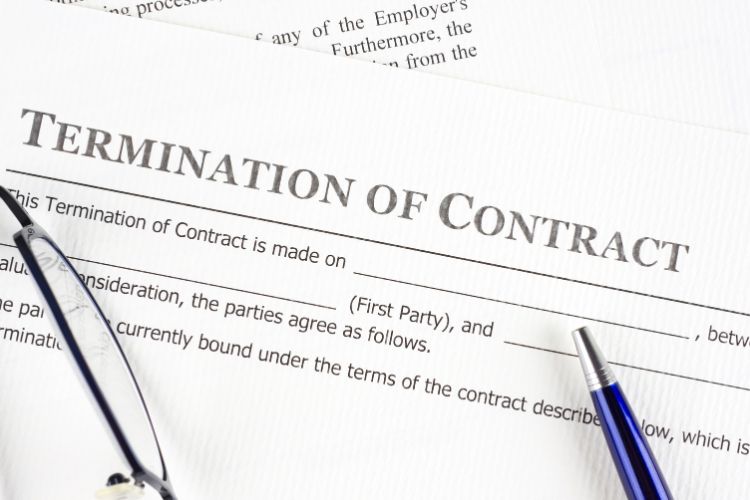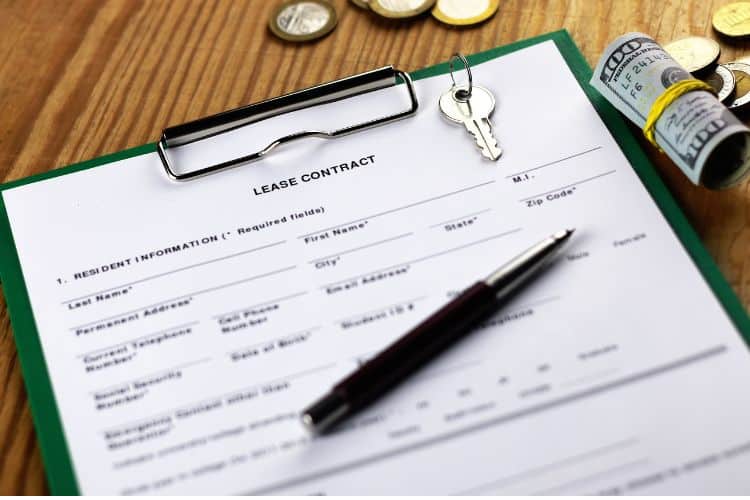Have you ever found yourself approaching the end of your lease, wondering about your options, and thinking, can I not renew my tenant’s lease?
It’s a question that many face when they’re contemplating their living situation. As the lease term wraps up, it’s natural to think about whether you want to stay or seek new living arrangements.
This prompts many queries and uncertainties. So, if you’re struggling with the decision, you’ve come to the right place.
In this article, we’ll walk through this together to unravel the complexities of lease renewals and terminations, offering insights and guidance to help you navigate this process smoothly.
Understanding Lease Agreements and Termination
Before we jump into how to terminate your lease, there are a few key pieces of information you should know.
In this section, we’ll dive into the exact nature of your lease and what the document entails. Here’s a closer look at the various aspects of rental agreements and the possibilities of termination.
Lease Agreements Overview
Lease agreements establish the legal relationship between a tenant and a landlord, outlining the rights and obligations of both parties. They encompass crucial details like the lease duration, rental amount, responsibilities for maintenance, and any specific clauses pertinent to the tenancy.
Explaining Fixed-Term and Periodic Agreements
Fixed-term agreements have a set duration, commonly six months or a year, providing a clear end date. Conversely, periodic agreements don’t specify an end date, operating on a rolling basis, with rent paid at regular intervals.
Understanding these different types of agreements is pivotal in determining your rights for renewal or termination.
Automatic Renewal Laws and Termination
Automatic renewal laws can vary greatly across regions, and understanding them is essential.
In some cases, commercial leases automatically transition into periodic tenancies upon expiry, while others demand explicit renewal or termination notices.
Plus, knowing whether you can cancel your lease at any time hinges on the agreement type and local tenancy laws. It’s crucial to grasp these legal aspects to make informed decisions regarding lease continuation or termination, particularly in the context of Qld property management.
Key Aspects of Lease Termination
When considering the termination of a lease agreement, several fundamental aspects demand your attention. Here’s a detailed exploration to make your life easier.

1. Notice Periods and Requirements
Termination often requires adherence to specific notice periods. This can change according to the type of lease and local regulations.
Understanding these notice requirements is crucial. Fixed-term leases typically necessitate advance notice before expiration, while periodic agreements may involve shorter notice periods for termination.
2. Conditions for Termination
The conditions stipulating a legally valid termination include fulfilling contractual obligations. This may seem like a lot of technical jargon, but the concept is quite simple.
It means that to cancel your lease, you have to comply with all the terms present in your initial rental contract.
For example, you’ll need to complete all your home maintenance duties. That includes cleaning the property and paying rent punctually. Read here if you have a co-tenant who is not paying rent.
Failure to meet these conditions may make the termination process more challenging.
3. Addressing Unpaid Rent and Breach of Terms
Unpaid rent or breaching the terms of the lease agreement can complicate the termination process. The landlord may issue a notice to remedy the breach within a specific timeframe or proceed with eviction actions.
Knowing how to navigate these situations is crucial for tenants seeking to terminate their lease legally.
Tenant Rights and Responsibilities When Ending a Tenancy
When it comes to terminating a tenancy, renters hold specific rights and responsibilities outlined within the lease agreement and local tenancy laws. You have to be aware of these aspects to navigate the termination process smoothly.
1. Tenant’s Options for Lease Termination
Tenants in a fixed-term lease may explore different avenues to terminate the agreement before the end date. One common approach is negotiating with the landlord or property manager to reach a mutual agreement to end the lease early.
Such conversations may involve paying a penalty fee or forfeiting a portion of the security deposit, so it’s essential to discuss these details thoroughly.
On top of that, tenants in periodic agreements can provide the required notice to end the lease as per the agreement terms or local laws. Being aware of the notice period of time stipulated in the lease and ensuring compliance is crucial to terminating the tenancy agreement smoothly.
2 . Rights Regarding Early Termination
Tenants hold rights entitling them to early lease termination under specific circumstances, like lease violations by the landlord or uninhabitable living conditions.
In such cases, tenants can issue a formal notice to the landlord detailing the issues and providing a reasonable timeframe for resolution. If the landlord fails to address the concerns within the stipulated time frame, tenants have legal grounds to terminate the lease without penalty.
3. Seeking Professional Guidance
Given the complexity of tenancy laws and lease agreements in Australia, seeking advice from property management experts or legal professionals specialising in tenancy laws in the Gold Coast is advisable.
These professionals can provide comprehensive guidance on the tenant’s rights, available options, and the proper procedure for terminating a lease early.
Property Owner’s Role in Tenant Lease Termination
The role of property owners or managers in a tenant’s lease termination is pivotal, influencing the smooth transition at the end of a residency.
1. Property Manager’s Notice and Communication
Property managers in the Gold Coast often initiate early communication with tenants nearing the lease expiration date. They may inquire about the tenant’s intentions, aiming to secure advanced notice regarding lease renewal or vacation plans.
So, clear communication channels ensure both parties are aware of the next steps and prevent misunderstandings.
2. Legal Obligations and Options
Property owners or managers hold legal obligations when tenants express their intent to terminate the lease. They must adhere to the tenancy laws and lease agreements’ provisions, ensuring compliance with notice periods and other termination-related requirements.
3. Addressing Lapsed Leases and Eviction Notices
When a lease lapses or tenants fail to give proper notice, property managers may issue eviction notices, prompting tenants to vacate the premises within a specified period.
Handling lapsed leases or eviction notices requires strict adherence to the law, and the landlord must follow all legal procedures.
By maintaining transparency, adhering to legal obligations, and offering guidance, property managers can assist tenants in navigating the lease termination process effectively.
Managing Lease Amendments Instead of Termination

If you’re considering terminating your lease due to unfavourable conditions, but are not keen on moving, there’s a viable alternative.
Luckily, tenants can make amendments to their rental agreement. These modifications provide a pathway to adjust existing terms and conditions to suit your needs better without having to move out.
Amending your lease offers an opportunity to renegotiate specific terms, such as rental costs, the duration of the lease, or clauses related to property maintenance. This approach allows for changes within the framework of the existing lease, creating more favourable conditions for both tenants and property owners.
If that sounds like an interesting idea, consider speaking with your property management to discuss the possibility of lease amendments. They can guide you through the process and help draft the necessary lease addendum.
These changes can involve modifying rental terms, adjusting the lease period, or incorporating new clauses to address concerns without the hassle of relocating.
Besides that, mid-lease changes, such as amending the agreement to reflect revised rental terms or other conditions, can be crucial in ensuring your comfort and satisfaction as a tenant.
However, remember that modifications require mutual agreement between the tenant and the property owner, and they may impact your credit score or financial standing.
Because of that, it’s advisable to thoroughly review proposed amendments and their potential implications before finalising any changes to the existing lease.
The Renewal Decision-Making Process
Deciding whether to continue your lease or explore alternative housing options can be a pivotal moment. Before finalising your choice, take a step back to evaluate your current situation and future plans.
Start by reviewing the terms of your existing lease agreement. Consider your present satisfaction with the property.
Are you content with the location, space, and amenities, or do you find yourself wanting a change? Reflect on your lifestyle needs and whether your current residence fulfils them.
Next, weigh the pros and cons of lease renewal versus moving out. Analyse the financial aspects, including potential rent changes, upkeep costs, and any alterations to your budget.
Plus, you should evaluate the convenience and flexibility each choice offers, bearing in mind your long-term objectives.
Another critical factor to keep in mind is your relationship with your landlord or property management. Have you experienced difficulties or had a positive experience with them?
Ultimately, when faced with the decision to renew or not, it’s beneficial to envision how your choice aligns with your future goals and lifestyle. This ensures that the path you choose aligns with your needs and preferences for the upcoming lease term.
Wrapping Up
Can I not renew my tenant’s lease? The decision to terminate your rental agreement involves various options.
You hold the power to terminate through proper notice within a specified period of time. Remember, compliance with the lease rules is crucial.
Alternatively, discussing amendments to your rental agreement with your property manager could provide favourable adjustments.
Whether opting for lease termination or amendments, always ensure your decision aligns with your preferences and long-term plans. Your tenancy journey should reflect your aspirations for a comfortable and suitable living space.

